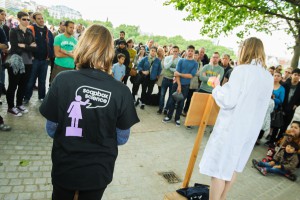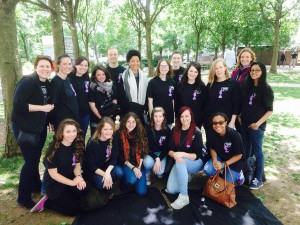 Katy Clough is a PhD student in Physics at King’s College London. She works on Einstein’s theory of General Relativity (GR), a theory of gravity which tells us that spacetime is curved by the presence of energy and matter.
Katy Clough is a PhD student in Physics at King’s College London. She works on Einstein’s theory of General Relativity (GR), a theory of gravity which tells us that spacetime is curved by the presence of energy and matter.
Join her on saturday the 28th of May, 2-5pm on the Southbank in London to hear her talking about “Why blackboards sometimes aren’t enough – using supercomputers to simulate the Universe”.
SS: How did you get to your current position?
KC: I studied A level Maths, Further Maths, Physics and Biology at school, before going on to do a degree in Engineering Science at Oxford University. I specialised in information and control engineering, which I loved, and I wrestled for a while with the idea of doing a PhD in control systems. But in the end I went to work in finance in London.
Realising that I missed science, I did an Open University degree in Physics in my spare time. Having completed this I applied to several Universities to do a PhD in Physics, and was fortunate to get a place at King’s working with Dr Eugene Lim. In retrospect I was enormously lucky to get a place after such an unusual career path, but I firmly believe you can achieve whatever you want if you are just determined (or perhaps pig-headed) enough, and fortunately there are always a few people like Eugene out there who are willing to give you a break.
SS: What, or who, inspired you to get a career in science?
KC: Ironically I would say that it was working in finance that inspired me to have a career in science. When I was at University I took what I was doing for granted, and it was only after I left that I realised how much I had loved it. In finance, I worked conscientiously and I was pretty good at it, but at the end of the day I just didn’t care about what I was doing. I wasn’t motivated by money, or career progression, and the work lacked most of the creative and analytic aspects of science that I enjoyed. As I approached thirty, I started to feel a panic about the many years of work still ahead of me and I imagined that one day I would look back and ask, “what did I do with my life?”. For me, the most worthwhile thing that humans do is science, and I realised that if I aligned my job with what motivates and inspires me, I could achieve so much more than working somewhere just to pay the bills.
SS: What is the most fascinating aspect of your research/work?
KC: I work on Einstein’s theory of General Relativity (GR), a theory of gravity which tells us that spacetime is curved by the presence of energy and matter. What is fascinating is that GR really challenges your inbuilt perceptions about what time and space actually are. Human brains evolved in a weak gravity environment and as a result we have an effective, but incomplete, model of how things work which we rely on to solve everyday tasks. Physics helps us to probe deeper and when we do what we find is absolutely mind-blowing – GR is completely counter-intuitive in many respects. I sometimes want to shake people on the street and say “Do you know about this? Do you understand what it means? Because it’s amazing, and I can’t believe that you will live your whole life without thinking about it”.
In my work I model extreme cases of gravity using computers, and this is an area where there is still a lot of unexplored territory. It is exciting that there is so much more to understand about the Universe, and that what we find may really surprise us.
SS: What attracted you to Soapbox Science in the first place?
KC: I don’t want to be arrested for shaking people in the street and telling them about my research, so I thought it would be best to do it through an official event!
In addition, I’m very passionate about getting more women into science, and helping them stay there. It is shameful that women end up, for varied and complex reasons, excluded from such an interesting, rewarding and important career.
SS: Sum up in one word your expectations for the day – excitement? Fear? Thrill? Anticipation?
KC: Nervousness! I hate public speaking, even though I now have to do it a lot for research and outreach. Fortunately my nerves usually go away once I start talking…
SS: If you could change one thing about the scientific culture right now, what would it be?
KC: Postdoctoral positions generally last for two years, and are temporary contracts. You often have to move countries, and you keep having to move until you find a permanent position, which can take years. This makes it enormously hard to have stability – professionally, financially and in relationships.
I don’t think it is productive to force researchers to move so frequently, and I think many excellent researchers (male and female) are lost because they can’t deal with the uncertainty and inconvenience that it introduces into their lives, especially when they are working for relatively low salaries compared to what they could get in a commercial role. There’s a somewhat macho culture that promotes the idea that those who are really dedicated to science should be willing to sacrifice a personal life to pursue something they love, but I find this ridiculous. Someone can be a good researcher and still want to find a balance with other parts of their life.
SS: What would be your top recommendation to a female PhD student considering pursuing a career in academia?
KC: It is important to surround yourself with people who push you forward, who believe in you more than you do, and who are willing to prioritise you over what they want. There are always people who would be happy to see you fail, because they don’t like you or feel a sense of competitiveness towards you. But more often as a woman the danger comes from people who care about you and want to shield you from disappointment and failure, or those who mistakenly think you might actually be happier if you just settled down, had kids and took an easy, more stable job. Others think of how your life fits in with theirs, and convince themselves that what is best for them must be best for you.
These people are not really bad but they are a slow drain on your resolve to continue in a space that can be very challenging. When you find someone who makes you feel strong enough to try and fail, rather than making you feel like you need to compromise, that is someone to keep around you.
 Jessica Clark is a PhD student at the University of Edinburgh, working in the Institute of Evolutionary Biology. Her research is about how epigenetic maternal effects can impact offspring fitness and the role this plays in disease transmission. Catch Jessica on her Soapbox on Sunday July 24th in Edinburgh where she will talk about “Mumma’s always right! How mums prepare their offspring for the big bad world”.
Jessica Clark is a PhD student at the University of Edinburgh, working in the Institute of Evolutionary Biology. Her research is about how epigenetic maternal effects can impact offspring fitness and the role this plays in disease transmission. Catch Jessica on her Soapbox on Sunday July 24th in Edinburgh where she will talk about “Mumma’s always right! How mums prepare their offspring for the big bad world”.

 Clare Duncan (@whereisklara) is currently a PhD student based between the Institute of Zoology (Zoological Society of London) and University College London. Her research focuses on the services that mangrove forests provide to humans in the face of climate change: carbon storage and coastal protection from tropical storms and typhoons. Her work involves using field- and satellite remote sensing-based techniques to understand how mangrove diversity influences, how and where best to rehabilitate, and the impacts of combined human and climate change pressures on the resilience of, the climate change mitigation and adaptation capacity of mangroves. Clare will be speaking on “Mangroves: the roots of the sea and shield of the land” at the Soapbox Science London event on 28th May 2016.
Clare Duncan (@whereisklara) is currently a PhD student based between the Institute of Zoology (Zoological Society of London) and University College London. Her research focuses on the services that mangrove forests provide to humans in the face of climate change: carbon storage and coastal protection from tropical storms and typhoons. Her work involves using field- and satellite remote sensing-based techniques to understand how mangrove diversity influences, how and where best to rehabilitate, and the impacts of combined human and climate change pressures on the resilience of, the climate change mitigation and adaptation capacity of mangroves. Clare will be speaking on “Mangroves: the roots of the sea and shield of the land” at the Soapbox Science London event on 28th May 2016.










